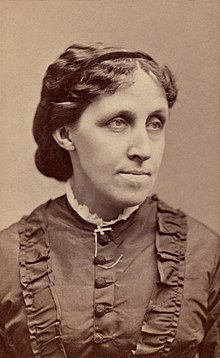Louisa May Alcott | |
|---|---|
 Alcott, c. 1870 | |
| Born | November 29, 1832 Germantown, Pennsylvania U.S. |
| Died | March 6, 1888 (aged 55) Boston, Massachusetts, U.S. |
| Resting place | Sleepy Hollow Cemetery, Concord, Massachusetts, U.S. |
| Pen name | A. M. Barnard |
| Occupation | Novelist |
| Period | American Civil War |
| Genre |
|
| Subject | Young adult fiction |
| Signature | |
Louisa May Alcott (/ˈɔːlkət, -kɒt/; November 29, 1832 – March 6, 1888) was an American novelist, short story writer, and poet best known for writing the novel Little Women (1868) and its sequels Good Wives (1869), Little Men (1871), and Jo's Boys (1886). Raised in New England by her transcendentalist parents, Abigail May and Amos Bronson Alcott, she grew up among many well-known intellectuals of the day, including Margaret Fuller, Ralph Waldo Emerson, Nathaniel Hawthorne, and Henry David Thoreau. Encouraged by her family, Louisa began writing from an early age.
Louisa's family experienced financial hardship, and while Louisa took on various jobs to help support the family from an early age, she also sought to earn money by writing. In the 1860s she began to achieve critical success for her writing with the publication of Hospital Sketches, a book based on her service as a nurse in the American Civil War. Early in her career, she sometimes used pen names such as A. M. Barnard, under which she wrote lurid short stories and sensation novels for adults. Little Women was one of her first successful novels and has been adapted for film and television. It is loosely based on Louisa's childhood experiences with her three sisters, Abigail May Alcott Nieriker, Elizabeth Sewall Alcott, and Anna Alcott Pratt.
Louisa was an abolitionist and a feminist and remained unmarried throughout her life. She also spent her life active in reform movements such as temperance and women's suffrage. During the last eight years of her life she raised the daughter of her deceased sister. She died from a stroke in Boston on March 6, 1888, just two days after her father's death and was buried in Sleepy Hollow Cemetery. Louisa May Alcott has been the subject of numerous biographies, novels, and a documentary, and has influenced other writers and public figures such as Ursula K. Le Guin and Theodore Roosevelt.